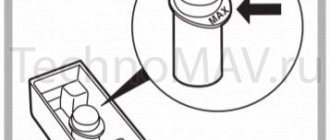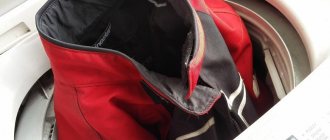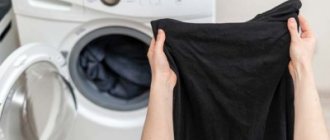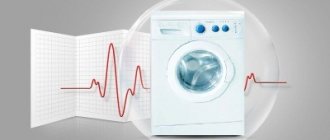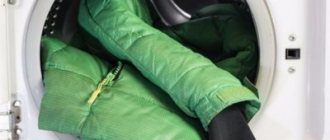Washing frequency
The frequency of washing is not regulated by the manufacturer. Each machine has its own resource, but it does not limit the regularity of its use - you need to start the SMA as needed. Some turn on the machine every day, others - once every few days, and others - wash it several times a day.
Most modern models do not have a minimum loading threshold, so you can put even one thing in the machine - for example, jeans or a T-shirt. The optimal operating mode for equipment, experts say, is 3-4 times a week. There should also be no long downtime. It is recommended to operate the device at least once a month, otherwise some parts may dry out.
Full drum or half
Sometimes it happens that the washing machine is not fully loaded. This is called "half load".
Some models have a special function for half-loading laundry. The function allows you not to accumulate a lot of dirty clothes, but to wash them gradually, running small cycles of small loads. Half wash saves a lot of water.
A full drum (up to 9 kg depending on the manufacturer) is recommended for those who are used to washing large volumes of fabrics. In this case, much more water is wasted, but washing occurs more intensively.
Installation Rules
Proper washing begins with the correct installation of the machine. A machine placed on an imperfectly flat surface will make noise and vibrate. You can't put it anywhere. The device is placed on a hard and level surface, using a building level. The legs are firmly fixed with locknuts. It is imperative to place a rubber mat on the tiles so that the machine does not move during operation.
How much to load?
It is uneconomical to load things in small batches. If the SMA has a decent load of about 7-8 kg of dry laundry, it is more profitable to accumulate more of it in order to wash it in one cycle. By loading the drum to the maximum, you save water, powder, and electricity. Of course, you need to comply with restrictions - you should not pledge more than what is required.
Why you can’t overload the SMA:
- Vibrations increase, especially during spinning at high speeds. This accelerates the wear of components and the entire device as a whole.
- When overloaded, the motor operates under extreme conditions - it overheats and can even burn out.
- In cramped spaces, clothes are washed less well and rinsed poorly.
It should be noted that the maximum load applies, most often, only to cotton; other fabrics - synthetics, wool and others - are loaded in smaller quantities. For each model, see a special table regulating loading standards for different types of fabric.
If you put off doing laundry, you need somewhere to store your dirty clothes. Often they are simply thrown into the drum. A musty and unpleasant odor may appear there, which will have to be removed using special means. Therefore, it is better to put dirty laundry in special ventilated baskets. Without access to air, in damp conditions, soiled items can become stained, and it will be extremely difficult to remove them.
Turning on and starting the washing machine
How to turn on the washing machine correctly?
After you have sorted the items by color and weight, you can directly start using the washing machine. To do this, you need to turn it on. How to do this is always indicated in the instructions. We will also give some practical tips:
- Connect the machine to the sewer and pipeline.
- Check your drainage system to avoid flooding yourself or your neighbors.
- Press the power button on the control panel.
- Pour the powder into a special container or place the cap filled with liquid powder directly into the drum.
- Select a mode or manually adjust the temperature, spin, and wash time.
- Launch the selected settings.
How to sort?
Mutual staining and molting are one of the most harmful consequences of violating the rules of operation of the SMA. Before starting the machine, you need to sort the laundry. White is set aside separately from everything. But not only color plays a role. You should know which colors can be washed together and which fabrics are compatible with the washing cycle.
Cotton and wool products cannot be loaded in one batch. This is irrational, and also harmful to the wool. To make cotton clean, you need hotter water and higher speeds. In such conditions, woolen products are deformed. But cotton items cannot be washed in a delicate mode suitable for wool.
When determining which items can be washed together, look at their color, material, as well as care labels - they indicate the optimal temperature, whether bleach can be used, and other details.
Down jackets
How to wash
First of all, study the information on the sew-in label: your down jacket may only be suitable for dry cleaning. If you can wash it, unfasten the hood and remove the fur. Check if there are any holes in the pockets or lining, otherwise after washing you will have to scoop out the runaway filler from the machine.
Fasten the down jacket with a zipper and buttons, turn it inside out and put it in the machine with a couple of wash balls. You can use regular tennis balls instead. They will not allow the filler to clump together.
For washing, it is better to use a special liquid detergent: regular powder is more difficult to rinse out and leaves streaks on the fabric. Wash the down jacket at a temperature not exceeding 30 °C with an additional rinse, and set the spin cycle to 600 rpm.
How to dry
After washing, unfasten the fasteners and turn the down jacket right side out. You can dry it on a hanger, but you will have to shake the jacket periodically, whipping up the filler.
If the apartment is cool, a jacket with natural down will take a long time to dry, and the filling will begin to rot. In this case, a dryer will help out: you can dry your jacket in it at a minimum temperature. Pre-wring the item by hand or in the washing machine so that water does not drip from the down jacket.
How to wash white and colored items?
There are special powders for white things. They cannot be used for colored people - over time they will begin to lose color. For whites, bleaching agents are also recommended, preferably oxygen ones.
Colored clothes are washed with powders containing special crystals that preserve the richness of the colors. There are anti-shedding agents - if you use them, you can simultaneously put products of different colors into the machine: blue, green, red. The dosage is determined in advance - read the instructions for use on the packaging and follow them. Also take into account the hardness of the water and the degree of contamination - detergents usually indicate doses for different situations.
Preparation
Before washing any item, it should be soaked. This even applies to new underwear. After all, how many hands touched it before it ended up in your bedroom or on you. During the first wash, excess dyes are removed, as well as compounds that ensure long-term storage of products. Before loading into the washing machine, soaked laundry should be washed in cool water. You can add a small amount of powder. As a result, the bed remains soft and pleasant for a long time.
Recommendations on the product label
Labels on products are similar to instructions for medications. We don't take pills at our own discretion. So the manufacturer made sure to give the owner a squeeze of information that cannot be ignored. It helps you wash things properly in the washing machine. Otherwise, you will only have yourself to blame.
Sorting
Many housewives have had the bitter experience at least once in their lives when a red sock or a green towel repainted everything that was nearby, although it was originally snow-white or light colors. Therefore, first of all, before washing white items, they should be separated from colored ones.
Then pay attention to the material of manufacture. It determines in what mode and at what temperature things will need to be washed. It is also important to consider the degree of contamination. Heavily soiled linens should not be washed at the same time as those that just need to be freshened.
Do I need to turn things inside out before washing?
This procedure is required. It reduces wear on the front side of products. In addition, with pillowcases from feather pillows, feathers and small debris can get into the car.
Choosing a care product
If you use the detergent correctly, your laundry will be clean and your equipment will be safe. Here are their main types:
- Powdery. They cope well with dirt, but are not completely washed out and lead to wear and tear on the fabric.
- Liquid, they have a mild effect, but are less effective.
- Capsules. They have the benefits of gels and powders.
The following are used as auxiliary means:
- bleaches for removing difficult stains;
- conditioners for softening fibers, imparting a lasting pleasant aroma and removing static electricity.
Basic recommendations or rules for effective washing:
- The hand wash option is accompanied by excessive foaming and can cause machine failure.
- Exceeding the dosage will not improve the result. The machine will suffer and will have to be cleaned more often.
- Powders for colored laundry do not contain bleaches. But they contain paint fixatives, which allow the drawing to remain bright and expressive for a long time.
- Products for white fabric include small amounts of mild bleaches.
To delicately care for clothes, they must be washed with formulations that do not contain enzymes or bleaching components.
For children's underwear, you should choose hypoallergenic formulations without enzymes, phosphorus-containing compounds and fragrances.
Treating stains
First, about pollution in general. They are conventionally divided into the following types:
- Soluble in water. They consist mainly of sweat salts. Simple detergents are suitable for removal.
- Insoluble. We are talking about color pigments, dust particles, and grease stains. They are removed with special stain removers.
Stains on a favorite item are a problem that can deprive the owner of her peace. When they appear, take action, that is, wash them quickly. Otherwise, you will have to resort to expensive professional dry cleaning services.
Author:
Anastasia Kukushkina
I hope you enjoy the article I have prepared for you! If you find errors in it, write to me about it! I will answer any questions you have, ask them!

